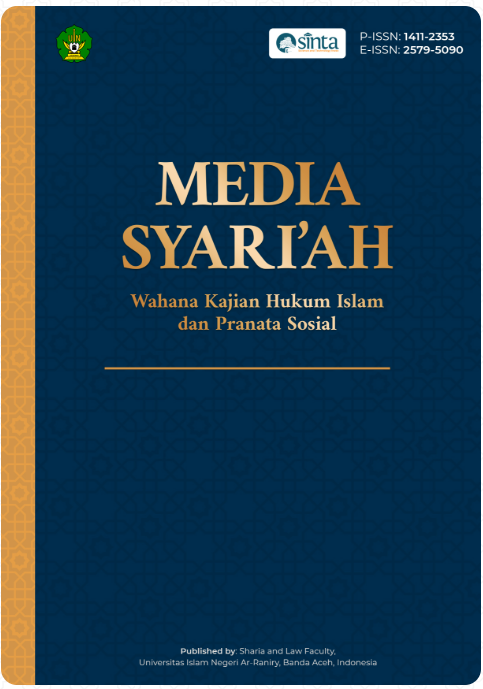Pancasila Legal Theory and Indonesia's Marine Economic Rights Management in International Law
DOI:
https://doi.org/10.22373/jms.v25i1.15946Keywords:
Marine Economic Rights, Pancasila Legal TheoryAbstract
As long as the government is unable to properly manage natural resources, the maritime economic rights of Indonesia will continue to be poorly managed, resulting in a significant loss of the country's marine wealth to other countries. Protecting Indonesia's marine resources requires an applicable legal theory. Pancasila's legal theory can provide answers since the principles it upholds have always been at the heart of Indonesian society. This justice and civilization need the state to correctly use its rights and obligations and not take away the maritime resources of other countries; therefore, these principles should be adopted by the entire country. By assembling information on Indonesia's marine riches and legal theory resources such as the Pancasila legal theory, this study aims to establish norms in the field.
Selama pemerintah tidak mampu mengelola sumber daya alam dengan baik, hak ekonomi maritim Indonesia akan terus tidak terkelola dengan baik, sehingga kekayaan laut negara hilang secara signifikan ke negara lain. Melindungi sumber daya laut Indonesia membutuhkan teori hukum yang aplikatif. Dalam hal ini, teori hukum Pancasila dapat memberikan jawaban karena prinsip-prinsip yang dijunjungnya selalu ada di dalam jiwa masyarakat Indonesia. Keadilan dan peradaban ini membutuhkan negara untuk menggunakan hak dan kewajibannya dengan benar dan tidak merampas sumber daya maritim negara lain. Oleh karena itu, prinsip-prinsip ini harus diadopsi oleh seluruh negara. Dengan menghimpun informasi kekayaan laut Indonesia dan sumber teori hukum seperti teori hukum Pancasila, kajian ini bertujuan untuk menetapkan norma-norma pada tataran praktis.
References
Alvi Syahrin. (2022). TEORI HUKUM PANCASILA DALAM HUKUM NASIONAL. Webinar Teori Hukum Pancasila.
Asrori, F., Jati, I. K., Fitriono, R. A., Hukum, F., & Maret, U. S. (2021). KAJIAN PENANGGULANGAN TINDAK PIDANA PERIKANAN ILLEGAL FISHING DI LAUT NATUNA DALAM PERSPEKTIF. 8, 1–21.
Azra, A. (2006). Rejuvenasi Pancasila di Tengah Arus Globalisasi. HIKMAH Jurnal Studi Keislaman, 8(1), 0–24.
AGREEMENT ON PORT STATE MEASURES TO PREVENT, DETER AND ELIMINATE ILLEGAL, UNREPORTED AND UNREGULATED FISHING, (2009). https://www.ptonline.com/articles/how-to-get-better-mfi-results
Fadilah, L. N. (2019). Pelajaran Berharga Atas Kalahnya Indonesia terhadap Sengketa Sipadan dan Ligitan. Kompasiana.Com. https://www.kompasiana.com/linanurfadilah/5db7344bd541df307a3475f3/pelajaran-berharga-atas-kalahnya-indonesia-terhadap-sengketa-sipadan-dan-ligitan-distribusi-rupiah-di-perbatasan-diperkuat
Farida, A. (2016). Sebagai Sintesa Konvergensi Teori-Teori Hukum Di Indonesia. 60–69.
Febriansyah, F. I. (2017). Keadilan Berdasarkan Pancasila Sebagai Dasar Filosofis Dan Ideologis Bangsa. DiH: Jurnal Ilmu Hukum, 13(25), 1. https://doi.org/10.30996/dih.v13i25.1545
Goso, G., & Anwar, S. M. (2017). Kemiskinan Nelayan Tradisional Serta Dampaknya Terhadap Perkembangan Kumuh. Jurnal Manajemen STIE Muhammadiyah Palopo, 3(1), 25–37. https://doi.org/10.35906/jm001.v3i1.201
Hadi, S. (2018). HUKUM POSITIF DAN THE LIVING LAW (Eksistensi dan Keberlakuannya dalam Masyarakat). DiH: Jurnal Ilmu Hukum, 5(2), 259–266. https://doi.org/10.30996/dih.v0i0.1588
Harun, N. (2013). MAKNA KEADILAN DALAM PERSPEKTIF HUKUM ISLAM DAN PERUNDANG-UNDANGAN Nurlaila Harun. Nurlaila Harun, 5, 15.
ITLOS. (2015). ITLOS - Request for an Advisory Opinion by the Sub-Regional Fisheries Commission, Advisory Opinion, 2 April 2015 (Issue 21).
Jamilah, A., & Disemadi, H. S. (2020). Penegakan Hukum Illegal Fishing dalam Perspektif UNCLOS 1982. Mulawarman Law Review, 5(1), 29–46. https://doi.org/10.30872/mulrev.v5i1.311
Kementrian Perdangangan Republik Indonesia. (2017). Profil Komoditas Garam. 1–8.
Magdalena, D. (2018). Dinamika Hukum Perikanan Indonesia (Damai magdalena & Fransisca Adelina Sinaga). 233, 251–262. http://e-jurnal.peraturan.go.id/index.php/jli/article/view/249
Noor, S., & Putri, M. (2018). Indonesia Law Review THE STATE RESPONSIBILITY ON THE IUU FISHING : THE REFLECTION OF THE 2015 ITLOS ADVISORY OPINION ON IUU FISHING AND ITS RELEVANCE TO INDONESIA. 8(2). https://doi.org/10.15742/ilrev.v8n2.488
Putra Sitorus, A. (2018). Politik Hukum Perlindungan Usaha Mikro Kecil Menengah (Umkm) Dalam Masyarakat Ekonomi Asean. Doktrina: Journal of Law, 1(2), 125. https://doi.org/10.31289/doktrina.v1i2.1920
Ronal. (2022). Nilai Kekayaan Laut Indonesia Diperkirakan Capai Rp19,986 Triliun. Pasardana.Id. https://pasardana.id/news/2022/7/29/nilai-kekayaan-laut-indonesia-diperkirakan-capai-rp19-986-triliun/#
Rosana, F. C. (2020). Hanya 30 Persen Terumbu Karang RI dalam Kondisi Sangat Baik. TEMPO.CO, Jakarta. https://bisnis.tempo.co/read/1370914/hanya-30-persen-terumbu-karang-ri-dalam-kondisi-sangat-baik?page_num=1
Safrida, Afriani, I., & Fajri. (2021). Dampak Impor Garam Terhadap Produksi Dan Harga Garam Domestik Di Indonesia. Jurnal Bisnis Tani, 7(1), 25–36. http://jurnal.utu.ac.id/jbtani/article/view/3829
Syamsudin, M., & Dkk. (2009). PENDIDIKAN PANCASILA-totalmedia UII.
UNCLOS. (1982). United Nations convention on the law of the sea. Law of the Sea Bulletin, 2011(74), 1–15. https://doi.org/10.18356/0b9f0346-en
UUD. (2016). Undang-Undang Nomor 7 Tahun 2016 Tentang Karakteristik Hak Penangkapan Ikan Perlindungan dan Pemberdayaan Nelayan, Pembudi Daya Ikan, Dan Petambak Garam. 1, 2.
Downloads
Published
Issue
Section
License
MEDIA SYARI'AH: Wahana Kajian Hukum Islam dan Pranata Sosial has CC-BY-SA or an equivalent license as the optimal license for the publication, distribution, use, and reuse of scholarly work. Authors who publish with this journal agree to the following terms:
1. Authors retain copyright and grant the journal right of first publication with the work simultaneously licensed under a Creative Commons Attribution-ShareAlike 4.0 International License that allows others to share the work with an acknowledgment of the work's authorship and initial publication in this journal.
2. Authors are able to enter into separate, additional contractual arrangements for the non-exclusive distribution of the journal's published version of the work (e.g., post it to an institutional repository or publish it in a book), with an acknowledgment of its initial publication in this journal.
3. Authors are permitted and encouraged to post their work online (e.g., in institutional repositories or on their website) prior to and during the submission process, as it can lead to productive exchanges, as well as earlier and greater citation of published work (See The Effect of Open Access).
You are free to:
Share — copy and redistribute the material in any medium or format.
Adapt — remix, transform, and build upon the material for any purpose, even commercially.
The licensor cannot revoke these freedoms as long as you follow the license terms.
All papers published in MEDIA SYARI'AH: Wahana Kajian Hukum Islam dan Pranata Sosial are licensed under a Creative Commons Attribution-ShareAlike 4.0 International License.




.png)


.png)
.png)
.png)



